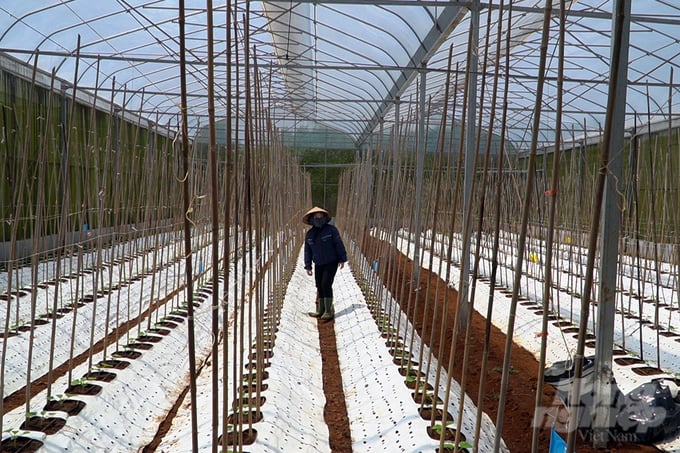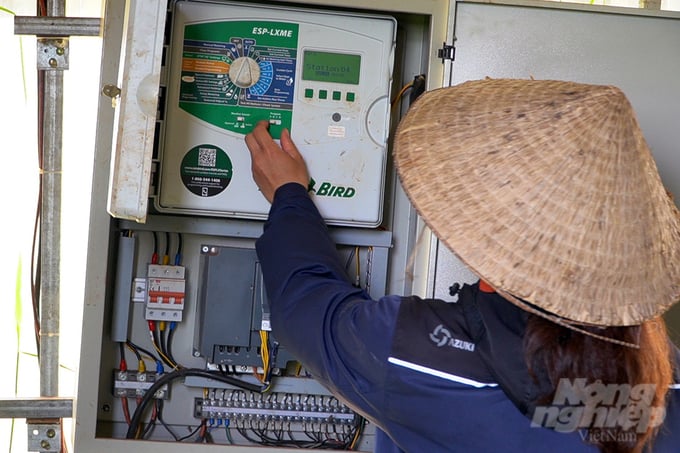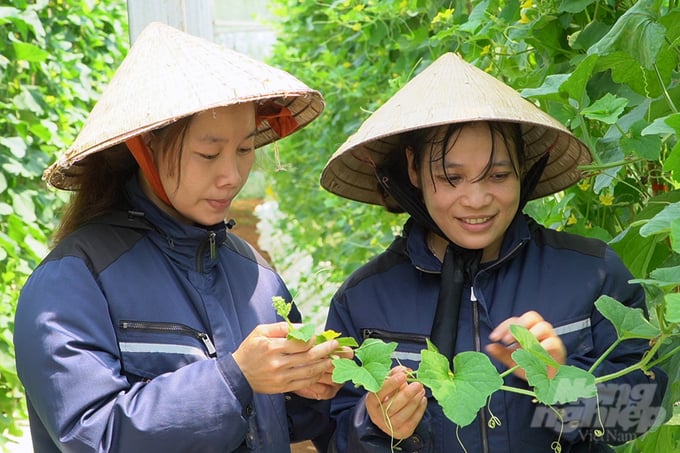June 23, 2025 | 05:44 GMT +7
June 23, 2025 | 05:44 GMT +7
Hotline: 0913.378.918
June 23, 2025 | 05:44 GMT +7
Hotline: 0913.378.918
Tran Thu Trang, a former agricultural land cadastral official with a relatively stable employment, surprised many when she resigned from her job to invest in establishing a high-tech agricultural farm in Vinh Giang commune, Vinh Linh district, Quang Tri province.

High-tech agricultural production in greenhouses sees limited application in Quang Tri; however, DFARM's model stands as a highlight in this region. Photo: Vo Dung.
At the end of 2019, Tran Thu Trang used 4 billion Vietnamese dong to lease land and build 10 greenhouses with a total area of 5,000 square meters in Dong Soi hamlet, Kim Thach commune, Vinh Linh district, Quang Tri province. The farm is equipped with an Israeli drip irrigation system. Between February and September each year, DFARM grows cantaloupes, honeydew melons, and watermelons based on orders from distributors in Hanoi, Hue, Da Nang, and other retail channels, with a total yield of 25 tons. The organic melon production at DFARM generates 1.6 billion Vietnamese dong annually, with a net profit of nearly 1 billion Vietnamese dong.
Between October and December each year, DFARM grows vegetables, tomatoes, and apples in preparation for the Lunar New Year market. Despite a relatively short cultivation cycle, DFARM earns approximately 500 million Vietnamese dong in profit during this time frame, with a net profit of nearly 300 million Vietnamese dong.
According to Trang, her previous work experience in the agricultural sector enabled her to venture into high-tech agriculture with confidence. Her family had previously cultivated a 2-hectare pomelo farm using a natural farming approach. In spite of the high yield, the inconsistent market demand prompted her to search for new solutions.
She began researching on social media and noted a growing consumer interest in health-beneficial products. However, she observed that the market dynamics for these items present numerous challenges, with prices often failing to reflect production costs due to consumer skepticism. As a result, she acknowledged that producers must gradually improve product quality and reduce production costs in order to overcome these challenges.

The greenhouses are supplied with water and nutrients through a simple operation. Photo: Vo Dung.
"I found myself wondering how to cultivate consumer trust in the products we create, so that they can be sold at a fairer prices. Perhaps the solution must start with the producer," confided Trang.
Driven by this introspection, Trang began researching and exploring various safe agricultural models. Ultimately, she concluded that only a high-tech agricultural model, utilizing pesticide-free greenhouse structures, is capable of establishing a new brand identity and earn consumer confidence.
"Despite the considerable investment in agriculture, with uncertain returns, I maintain unwavering faith. Building trust requires personal integrity. At present, DFARM's products encompass everything from organic seeds to cultivation techniques, with many aspects of the care process automated," Trang shared.
"I knew that investing such a large sum in agriculture was risky, and I wasn't sure when it would pay off, but I held on to my beliefs. Building trust requires personal integrity. At the moment, DFARM's products are purely organic, from seeds to cultivation methods. We have also automated various stages of the care process at DFARM," Trang shared.
It was not difficult to meet Trang, as she dedicates the majority of her time to DFARM. However, finding an opportunity to interview her regarding DFARM proved to be a challenge.
Amidst the scorching heat of Central Vietnam, a woman in her forties emerges from the greenhouse in worn work clothes, her forehead glistening with sweat. Despite outdoor temperatures ranging between 30 to 35 degrees Celsius, the interior of the greenhouse typically registers 3 to 4 degrees higher. Nevertheless, the significant temperature difference does not diminish Trang's commitment to her passion.

Retail channels account for between 40 and 50 percent of DFARM's product sales. Photo: Vo Dung.
For Trang, the end of her employees' workday is the beginning of her own routine, which involves a comprehensive inspection of all the greenhouses to maintain thorough care of the crops. The honeydew melon and watermelon harvesting season typically begins in early May at DFARM. During this time, various vegetables including gourds and zucchini have also begun their production; organic apple trees are preparing to bear fruit in preparation of the Lunar New Year market. Trang spends the majority of her day at DFARM during the harvesting season.
She led us to the automated irrigation system, explaining that greenhouses are supplied with drip irrigation water through a simple operation. The nutrient delivery to the crops based on different growth stages has also been pre-programmed.
"Engaging in high-tech agriculture is not as simple as many people assume. Weeds still need to be manually removed, crops still require daily monitoring and care, and many other tasks still require human intervention," Trang shared.
Despite the constant and exhausting work, Trang found immense joy in her achievements after five years of entrepreneurship. In contrast to the low number of retail customers in 2019, this customer base currently comprises 40 to 50 percent of DFARM's agricultural product sales.
"DFARM's products are typically priced at 2 to 2.5 times higher compared to that of traditionally produced agricultural products; however, our retail customer base has grown rapidly and steadily in just two to three years. This growth demonstrates a significant shift in consumer habits. There is nothing more satisfying than seeing our products being appreciated by consumers," Trang exclaimed.
Her passionate dedication to sustainable agriculture has greatly motivated her colleagues. She is a source of inspiration for young agricultural engineers and workers at DFARM. DFARM currently employs eight workers with monthly incomes ranging from 5 to 8 million Vietnamese dong. While not considered high income, especially for agricultural engineers, workers are drawn to DFARM not for financial gain, but out of a love for safe and high-tech agricultural practices, with the aim of benefiting both producers and consumers. Nguyen Lam Nhat Anh, an agricultural engineer from Quang Nam province, is a notable example.

Trang (right) inspires young engineers with her passion for ethical agriculture. Photo: Vo Dung.
In 2019, Nhat Anh joined DFARM immediately after graduating from Hue University of Agriculture and Forestry. The production environment at DFARM has provided him with numerous insights and a new perspective on the future of sustainable agriculture. It is this realization that has driven Nhat Anh to commit himself to DFARM and to the development of high-tech agriculture.
"High-tech agriculture is an inevitable global trend. Various tasks at the farm still require human intervention, while important tasks are supported by mechanization. But what I appreciate most is the clean and safe environment for both producers and consumers," Nhat Anh confided.
Passion and remarkable achievements notwithstanding, DFARM's development trajectory is marked with challenges. Organic and high-tech agriculture typically involves extensive growth cycles, unappealing appearances, and discerning consumer preferences. They stand as considerable obstacles on Trang's journey ahead.
"We have no need for lofty promises because our products' core value is the measure. We are confident that our agricultural model will become an inevitable trend in the future, and we are committed to walking this path," Trang shared, with determination.
Translated by Nguyen Hai Long
![Turning wind and rain into action: [9] Digitizing hydrometeorological data in response to climate change](https://t.ex-cdn.com/nongnghiepmoitruong.vn/608w/files/news/2025/06/17/z6704423696987_15fd32ffc26d590d204d520c9dac6786-nongnghiep-165943.jpg)
(VAN) Farmers have begun accessing hydrometeorological applications to adjust their cropping schedules, aiming to ensure productivity and adapt to climate change.
![Turning wind and rain into action: [8] Real-time salinity detection and early warning technology](https://t.ex-cdn.com/nongnghiepmoitruong.vn/608w/files/news/2025/06/17/z6704423696987_15fd32ffc26d590d204d520c9dac6786-nongnghiep-151127.jpg)
(VAN) Thanks to the integration of modern hydrological-hydraulic models, remote sensing technologies, and artificial intelligence, the accuracy of hydrological forecasting has significantly improved.
![Turning wind and rain into action: [7] Early disaster warnings help marine farmers minimize losses](https://t.ex-cdn.com/nongnghiepmoitruong.vn/608w/files/news/2025/06/17/z6704423696987_15fd32ffc26d590d204d520c9dac6786-nongnghiep-142942.jpg)
(VAN) In recent years, thanks to early disaster warnings and forecasting, marine farmers in Khanh Hoa province have been able to reduce risks and losses, thereby improving production efficiency.
![Turning wind and rain into action: [6] ‘Four on-the-spot’ disaster management software](https://t.ex-cdn.com/nongnghiepmoitruong.vn/608w/files/news/2025/06/17/e5a48259d6a262fc3bb3-nongnghiep-183800.jpg)
(VAN) By simply activating the scenario on the disaster management software, the relevant authorities immediately know how many households need to be evacuated, where to evacuate them to, and by what means of transportation…
![Turning wind and rain into action: [5] Hue applies modern technology in disaster forecasting](https://t.ex-cdn.com/nongnghiepmoitruong.vn/608w/files/news/2025/06/17/z6704423696987_15fd32ffc26d590d204d520c9dac6786-nongnghiep-093938.jpg)
(VAN) In Hue city, modern technology has recently been applied in meteorological and hydrological forecasting and warning, helping to reduce the damage caused by natural disasters.

(VAN) A cutting-edge farming technique being implemented on an experimental ranch in Arizona's Sonoran Desert has already saved a billion gallons of water over five years, according to Civil Eats.

(VAN) Poultry and pig production and the environment can be boosted through enhanced water technology, according to new research.